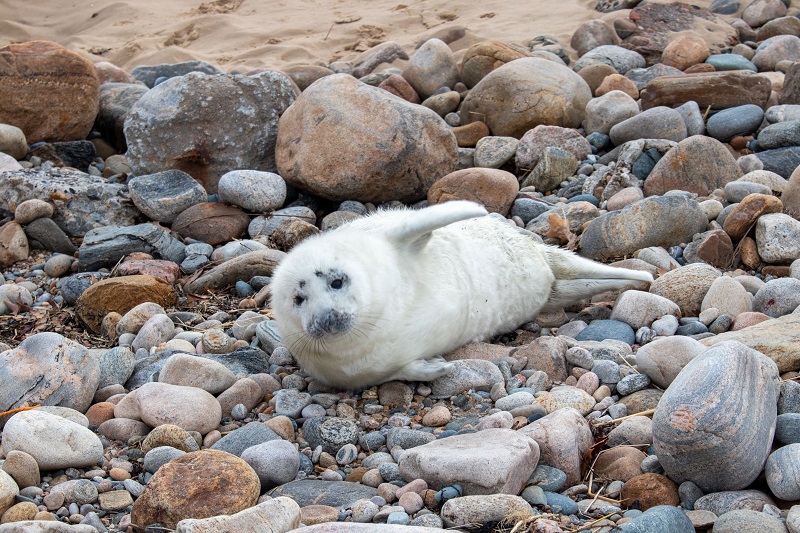Causes
Mystic Aquarium’s Animal Rescue warns southern New England after two seal pups found, one died

Westerly, RI (February 3, 2022)— Seal pup season has officially begun for Connecticut, Rhode Island, and surrounding areas. Over the past week alone, Mystic Aquarium’s Animal Rescue Program has responded to two hotline calls for young seal pups along the shoreline. Mystic Aquarium would like to inform the public what to expect, what to do, and how the Animal Rescue Team will respond to animals called into the hotline.
Seal pupping season generally ranges from December to March. After birth, pups will nurse for a few weeks and then at approximately three to four weeks, the mom weans her pup, and the young seal begins to learn how to survive on its own. This time period of independence is crucial to the seal’s transition into adulthood. Occasionally, the Animal Rescue Team is made aware of situations during this normal transition period when seal pups find themselves ashore alone If you happen to find a seal on the beach, keep at distance of over 150ft from the animal and make sure to give our hotline a call. Depending on the animal’s condition, Animal Rescue staff will either dispatch trained first responders to monitor the health of the animal or collect any sick or injured animal in need of medical attention for rehabilitation.
On January 25, Mystic Aquarium’s Animal Rescue Program investigated a reported gray seal pup alone on Misquamicut State Beach. The presumed female seal, due to her light grey coloration, is what Mystic Aquarium refers to as “BAR” – bright, alert, and responsive. She was in excellent body condition. The pup also had hydration rings around her eyes, indicating she was well hydrated, with pink gums. These conditions indicate she was a healthy seal.
Animal Rescue staff and the veterinary team decided that the best course of action was to monitor her health and safety. Volunteers and first responders vigilantly monitored and safeguarded the seal until she returned to the water Thursday morning to take on life in the ocean. The Animal Rescue Team continued to monitor her health and safety from a distance with binoculars until the seal eventually swam out of view.
The second reported seal pup occurred on February 1. Unlike the previous seal, this pup was found in very critical condition on Blue Shutters Town Beach. A health assessment concluded that the gray seal had a broken jaw and multiple puncture wounds on its head. The Animal Rescue Team transported the pup to Mystic Aquarium’s Animal Hospital. Veterinarians examined the seal, provided antibiotics, and administered pain medication while awaiting further diagnostics. Unfortunately, the seal’s wounds were too severe, and the pup succumbed to his injuries.
“I can speak for our whole Animal Rescue Team in thanking the local community for their concern on the Misquamicut seals wellbeing and respecting this animal by giving it plenty of space to rest without stress,” said Sarah Callan, Animal Rescue Program Manager. “We are also thankful for the community reporting the injured seal in Charlestown. Unfortunately, not every response ends with a happy ending, but our World Class Care can provide each animal admitted into our animal rescue clinic with the best chance for survival. Both responses show how invested our community is in the conservation and protection of local wildlife.”
Anyone who sees a pup should leave a message on the 24-hour Animal Rescue Hotline at 860.572.5955 x107 and expect a return call. They need to provide the animal with plenty of space. People and pets need to remain 150 feet away. Individuals should not touch, feed, or attempt to help the pup. Even if the animal appears to be dead, zoonotic diseases can transfer to humans and pets. The Animal Rescue Program responds to stranded marine animals along 1,000 miles of the Northeastern coastline throughout Connecticut, Rhode Island, and Fishers Island, New York. The Animal Rescue Team will respond and proceed with an appropriate course of action dependent on the animal’s condition.
-

 Community7 years ago
Community7 years agoNational Shrine of La Salette Festival of Lights 2017 set to begin
-

 Community6 years ago
Community6 years agoMassachusetts State Police looking for good home for retired dogs
-

 Crime6 years ago
Crime6 years agoFall River ranked most dangerous city in Massachusetts according to report
-

 latest7 years ago
latest7 years agoDurfee student allegedly overdoses on marijuana
-

 Community6 years ago
Community6 years agoVideo of Fall River Police goes viral
-

 Causes6 years ago
Causes6 years agoMissing Fall River woman found deceased
-

 Crime6 years ago
Crime6 years agoFall River Police add names to most wanted list
-

 Causes6 years ago
Causes6 years agoFall River teenager reported missing has been found




